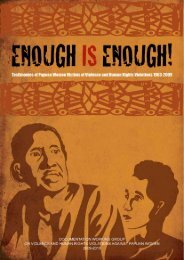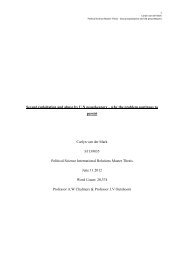The Impact of Armed Conflict on Women and Girls - UNFPA
The Impact of Armed Conflict on Women and Girls - UNFPA
The Impact of Armed Conflict on Women and Girls - UNFPA
Create successful ePaper yourself
Turn your PDF publications into a flip-book with our unique Google optimized e-Paper software.
Return <strong>and</strong> Reintegrati<strong>on</strong><br />
In additi<strong>on</strong> to the experiences <str<strong>on</strong>g>of</str<strong>on</strong>g> communities before <strong>and</strong> during<br />
displacement, the return <strong>and</strong> reintegrati<strong>on</strong> phase has a number <str<strong>on</strong>g>of</str<strong>on</strong>g> implicati<strong>on</strong>s for<br />
reproductive health status. <str<strong>on</strong>g>The</str<strong>on</strong>g> post-c<strong>on</strong>flict setting poses c<strong>on</strong>straints to meeting<br />
basic reproductive health needs while, at the same time, new needs will have<br />
arisen as a result <str<strong>on</strong>g>of</str<strong>on</strong>g> the c<strong>on</strong>flict.<br />
<strong>Women</strong>’s traditi<strong>on</strong>al roles, resp<strong>on</strong>sibilities <strong>and</strong> support networks become<br />
dramatically altered by involuntary migrati<strong>on</strong>, extended family networks may be<br />
completely lost <strong>and</strong> women may have to face hostilities from the community<br />
which did not leave during the c<strong>on</strong>flict. <str<strong>on</strong>g>The</str<strong>on</strong>g>re are many differences between<br />
returnees, IDPs <strong>and</strong> “stayees” which compound the reintegrati<strong>on</strong> process for<br />
many <str<strong>on</strong>g>of</str<strong>on</strong>g> these related to reproductive health status; gender relati<strong>on</strong>s;<br />
STI/HIV/AIDS levels; desired family size; experience <str<strong>on</strong>g>of</str<strong>on</strong>g> sexual violence; <strong>and</strong><br />
access to services.<br />
It is imperative that women are part <str<strong>on</strong>g>of</str<strong>on</strong>g> the peace building process as they<br />
play a key role in the health <str<strong>on</strong>g>of</str<strong>on</strong>g> entire communities, building bridges <strong>and</strong><br />
preserving social order. As has been shown women will invariably have taken <strong>on</strong><br />
new roles during displacement, gender attitudes may have changed <strong>and</strong> it is vital<br />
that these advances are not lost in the post-c<strong>on</strong>flict setting but rather are built<br />
up<strong>on</strong> in the rehabilitati<strong>on</strong> <str<strong>on</strong>g>of</str<strong>on</strong>g> societies.<br />
<str<strong>on</strong>g>The</str<strong>on</strong>g> disrupti<strong>on</strong> to the social fabric with traditi<strong>on</strong>al roles within families<br />
severely disrupted by the war <strong>and</strong> its aftermath was a key issue facing the<br />
MSI/Stope Nade programme. <str<strong>on</strong>g>The</str<strong>on</strong>g> challenge was to ensure that social<br />
rec<strong>on</strong>structi<strong>on</strong> needs were not lost in the rush to rebuild physical infrastructure.<br />
<str<strong>on</strong>g>The</str<strong>on</strong>g> programme aimed at facilitating the return <strong>and</strong> reintegrati<strong>on</strong> <str<strong>on</strong>g>of</str<strong>on</strong>g> displaced<br />
women <strong>and</strong> girls into viable family units <strong>and</strong> the community by promoting<br />
participati<strong>on</strong>, empowerment, self-reliance <strong>and</strong> self-organizati<strong>on</strong>.<br />
Educati<strong>on</strong>al activities to empower women to organize themselves in order<br />
to articulate their human <strong>and</strong> social rights <strong>and</strong> needs <strong>and</strong> to become active<br />
participants in local, nati<strong>on</strong>al <strong>and</strong> internati<strong>on</strong>al instituti<strong>on</strong>s were important factors<br />
in the reintegrati<strong>on</strong> process.<br />
Rec<strong>on</strong>ciliati<strong>on</strong>, c<strong>on</strong>flict resoluti<strong>on</strong> <strong>and</strong> reintegrati<strong>on</strong> were key aims <str<strong>on</strong>g>of</str<strong>on</strong>g> the<br />
project. <strong>Women</strong> who visited MSI centres were <str<strong>on</strong>g>of</str<strong>on</strong>g>ten instrumental in helping to<br />
overcome intolerance between nati<strong>on</strong>alities <strong>and</strong> trying to improve communicati<strong>on</strong><br />
between peoples regardless <str<strong>on</strong>g>of</str<strong>on</strong>g> nati<strong>on</strong>ality or religi<strong>on</strong>. <strong>Women</strong> were instrumental<br />
in helping to overcome difficulties between refugees, IDPs <strong>and</strong> returnees in<br />
mixed-group sessi<strong>on</strong>s in the centres.<br />
55




![IANSA [PDF, 2MB] - PeaceWomen](https://img.yumpu.com/25206379/1/190x123/iansa-pdf-2mb-peacewomen.jpg?quality=85)
![Commitments Sample [PDF, 93KB] - PeaceWomen](https://img.yumpu.com/25206331/1/190x245/commitments-sample-pdf-93kb-peacewomen.jpg?quality=85)










![A Toolkit for Advocacy and Action [PDF, 260KB] - Peace Women](https://img.yumpu.com/25205989/1/190x245/a-toolkit-for-advocacy-and-action-pdf-260kb-peace-women.jpg?quality=85)